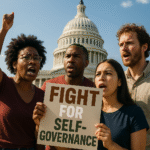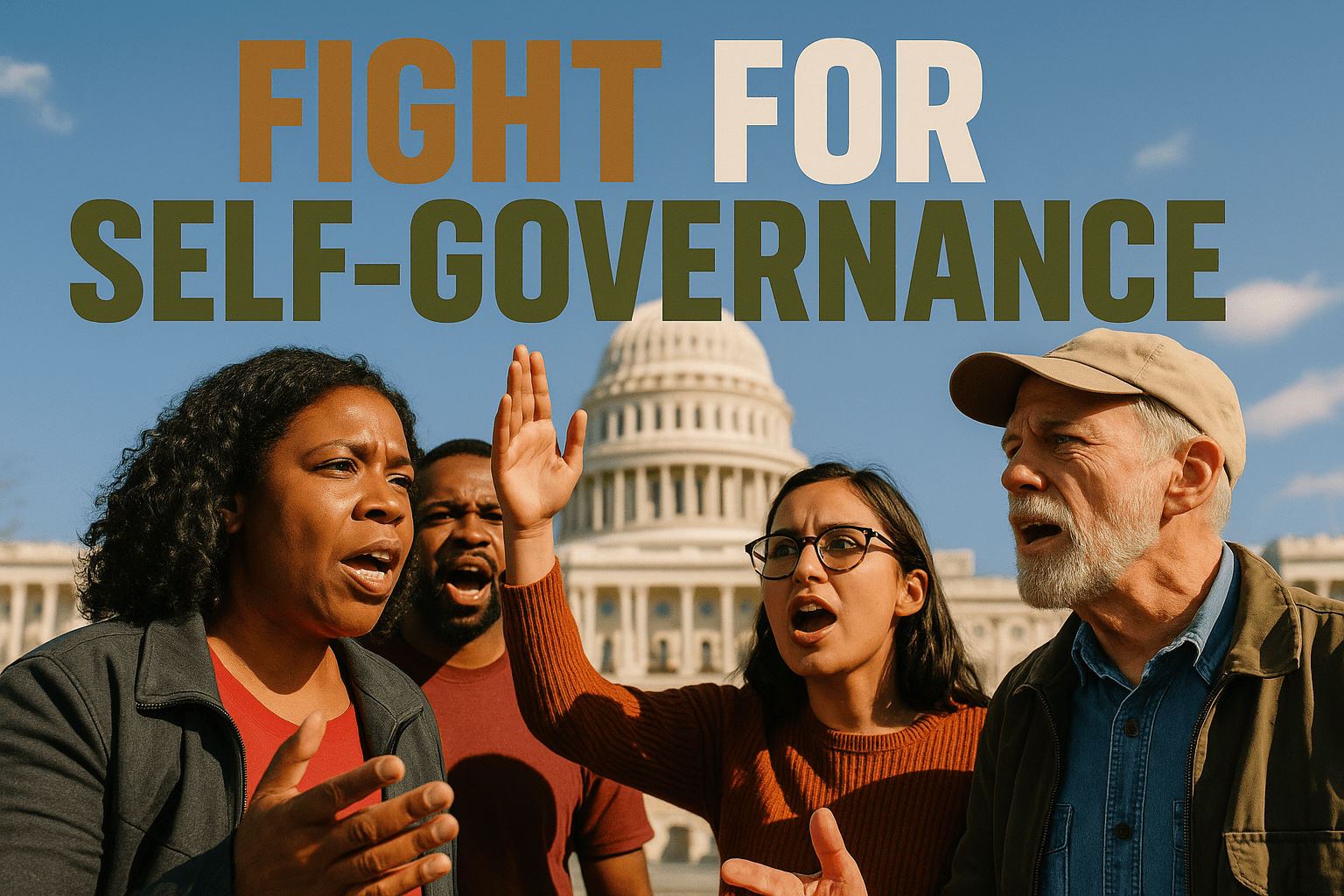

D.C.'s Fight for Self-Governance
By Darius Spearman (africanelements)
Support African Elements at patreon.com/africanelements and hear recent news in a single playlist. Additionally, you can gain early access to ad-free video content.
The Struggle for D.C. Autonomy
The expiration of President Donald Trump's emergency order concerning Washington, D.C.'s police force marks a significant moment. This order gave him direct control over the Metropolitan Police Department (MPD) (Washington Informer). It represented a major federal intervention into local governance. However, the struggle for D.C. residents to govern themselves continues. The August 11 declaration allowed Trump to take authority over the MPD. He cited a “crime emergency” in the capital as his reason (Washington Informer).
D.C. Attorney General Brian Schwalb challenged this action. He argued that the law did not permit a president to take full command of a local police force (Washington Informer). This legal challenge led the Justice Department to reduce its demands. They then only required certain police services related to immigration enforcement (Washington Informer). Despite these scaled-back demands, the federal takeover impacted daily life in the city. Federal agents joined MPD officers at traffic checkpoints and conducted immigration sweeps (Washington Informer). More than 1,600 people were arrested during this surge. A large majority, 80%, faced misdemeanors or low-level charges (Washington Informer).
The Home Rule Act Under Threat
The broader debate over D.C.'s self-governance and autonomy is ongoing. Some Republican lawmakers are actively trying to reduce local control. They have introduced legislation to repeal the Home Rule Act (WUSA9). This act allows D.C. residents to elect their own mayor and city council. If these efforts succeed, more decision-making power would shift to Congress (WUSA9). D.C. Delegate Eleanor Holmes Norton and other advocates for D.C. statehood argue that these measures diminish local control. They also prevent residents from governing themselves (WUSA9). Norton views bills to repeal D.C. Home Rule as evidence of progress toward statehood. She states that such efforts will only strengthen the case for D.C. statehood (WUSA9).
The Home Rule Act granted D.C. residents the ability to elect their local government officials (WUSA9). Its importance lies in providing a degree of self-governance to the District. Historically, D.C. has been under direct congressional control. Efforts to repeal the Act are seen as attempts to strip away this limited democracy. Bills introduced in Congress, such as the BOWSER Act, aim to repeal the D.C. Home Rule Act (AFRO). Delegate Eleanor Holmes Norton views these attempts as efforts to “take away what small measure of democracy” D.C. residents have (norton.house.gov). Historically, Congress has had to legislate on mundane local issues in D.C. This included dog leash laws and kite flying, highlighting the lack of local autonomy before the Home Rule Act (51st.news).
Crime and Community Trust
Despite claims of reduced crime during the federal operation, concerns remain. These concerns involve the impact on resident trust and the continued federal presence. An MPD report showed overall crime dropped 15% during the federal operation (Washington Informer). This was compared to the same period a year earlier. This included a 39% decline in violent crime and a steep drop in carjackings (Washington Informer). Mayor Muriel Bowser acknowledged decreases in gun violence and carjackings. However, she warned that cooperation between MPD and federal immigration agents “is not working” for residents’ trust in local policing (Washington Informer).
Even with the emergency order lapsing, MPD Police Chief Pamela Smith’s order remains in effect. This order permits limited cooperation with federal immigration authorities (Washington Informer). Thousands of National Guard troops from D.C. and eight Republican-led states remain deployed. Additional officers from the FBI, DEA, and other federal agencies are also present. Immigration raids continue (Washington Informer). Concerns about crime in D.C., including carjackings and homicides, are cited by those who want to repeal the Home Rule Act (NBC Washington). While homicides increased, overall violent crime in D.C. has reportedly gone down (NBC Washington).
Crime Rate Changes During Federal Operation
Federal Power and Local Resistance
Congress is considering measures that could further expand federal power over the District. D.C. officials and advocates continue to push for greater self-governance. House Republicans are considering bills that would tighten sentencing laws. They also want to lower the age at which juveniles can be tried as adults. These bills would restrict the D.C. Council’s authority on criminal justice (Washington Informer). Democrats, including Sen. Chris Van Hollen (D) of Maryland and D.C.’s Del. Eleanor Holmes Norton (D), have responded. They reintroduced legislation to grant the District full control over its police and National Guard (Washington Informer).
D.C. Councilmember Christina Henderson (I-At-Large) stated that the city remains vulnerable. She remarked, “With this administration and this particular crop of individuals in the Congress, you give an inch, they will take a mile” (Washington Informer). The US Senate is set to decide on D.C.'s fate in a funding bill. This comes amidst potential $1 billion cuts to city services (WUSA9). The search results indicate that Congress holds significant power over D.C.'s local governance. Some members are attempting to exert more federal control, especially over policing and other local policies. This creates tension with D.C.'s elected officials who advocate for local autonomy. Republican members of Congress have introduced bills to repeal the D.C. Home Rule Act. They aim to increase federal control over the District (AFRO). Congress previously overturned a D.C. crime bill, showing federal oversight and intervention in local D.C. legislation (NBC Washington).
The Statehood Movement's Momentum
The D.C. statehood movement aims to make D.C. the 51st state. This would grant its residents full voting representation in Congress and greater autonomy. The movement has seen significant progress. The House of Representatives passed statehood bills in 2020 and 2021 (norton.house.gov). Efforts to repeal the Home Rule Act are viewed by statehood advocates as further evidence of the need for statehood. Delegate Eleanor Holmes Norton views attempts to repeal the Home Rule Act as strengthening the case for statehood (WUSA9).
The House of Representatives passed the D.C. statehood bill in 2020 and again in 2021. This marked historic progress for the movement (norton.house.gov). Delegate Eleanor Holmes Norton consistently opposes these federal interventions. She views them as undermining the democratic rights of D.C. residents (norton.house.gov). Historically, Congress has been involved in very specific local D.C. matters. This included dog-pound sites and daylight saving time. This illustrates the extent of federal control before the Home Rule Act (51st.news).
Key Milestones in D.C. Statehood Movement
Impact on Residents and the Future Outlook
The provided search results mention that a majority of D.C. residents are Black and Brown. Attempts to repeal the Home Rule Act are seen as taking away their “small measure of democracy” (norton.house.gov). Concerns are also raised about the impact of cooperation with federal immigration agencies on community trust. Delegate Eleanor Holmes Norton emphasizes that the majority of D.C.'s over 700,000 residents are Black and Brown. Efforts to repeal the Home Rule Act aim to take away their “small measure of democracy” (norton.house.gov). Concerns exist that cooperating with federal immigration agencies would discourage immigrants from interacting with the police and other government agencies. This could potentially make D.C. less safe for all residents (AFRO).
The provided search results indicate ongoing legislative battles regarding D.C.'s autonomy and policing. Bills to repeal the Home Rule Act have been introduced. Some have passed the House. However, their ultimate passage is uncertain due to strong opposition. The D.C. statehood movement continues to push for full autonomy. They view these challenges as further justification for statehood. Bills to repeal the D.C. Home Rule Act have been introduced and referred to committees. Their progression is not guaranteed (AFRO). Delegate Eleanor Holmes Norton has stated her intention to defeat efforts to repeal the Home Rule Act. She believes they will strengthen the case for statehood (norton.house.gov). The House of Representatives has previously passed D.C. statehood bills. This suggests that the debate over D.C.'s autonomy and future status will continue (norton.house.gov).
D.C. Resident Demographics and Autonomy
The Ongoing Battle for D.C.'s Future
The legal basis for federal intervention in D.C. governance, specifically regarding the “emergency order” and Section 740 of the District of Columbia Home Rule Act of 1973, is not clearly defined in the provided information. The articles primarily focus on legislative attempts to repeal the Home Rule Act and the broader political debate surrounding D.C.'s autonomy. The precise legal limits on presidential and congressional authority over D.C.'s local governance and police are also not clarified. The information highlights instances of congressional intervention and attempts to repeal the Home Rule Act. However, it does not delve into the constitutional or statutory boundaries of such actions.
The provided search results do not contain information regarding the legal authority, purpose, or implications of National Guard deployment in D.C. Similarly, they do not contain information about specific changes in policing tactics or enforcement practices during any federal takeover, nor do they compare these to prior practices. There is also no information about coordination mechanisms between local and federal law enforcement agencies post-emergency order expiration. The cooperation between the Metropolitan Police Department (MPD) and federal immigration agencies is a contentious issue. This is particularly true because D.C. is a sanctuary city. The specific nature and legal basis of this cooperation are not detailed. However, the community impact is framed around concerns for public safety and trust. D.C. Mayor Muriel Bowser's proposed fiscal year 2026 budget included the repeal of the district's designation as a sanctuary city (AFRO). Delegate Eleanor Holmes Norton stated that cooperating with federal immigration agencies would make D.C. less safe. This would happen by diverting police resources and discouraging immigrants from interacting with law enforcement (AFRO).
Legislative Proposals and Political Context
Several legislative proposals aim to repeal the D.C. Home Rule Act. The most notable is the BOWSER Act. These bills are introduced by Republican members of Congress. They often cite concerns about crime and D.C.'s local policies. While some bills have passed the House, their likelihood of becoming law is uncertain. They face strong opposition from D.C.'s Delegate and statehood advocates. The broader political context involves a partisan divide over D.C.'s autonomy and statehood. The “Bringing Oversight to Washington and Safety to Every Resident (BOWSER) Act” was introduced to repeal the D.C. Home Rule Act (AFRO). These bills are often justified by concerns over D.C.'s crime rates and policies. This includes allowing non-citizens to vote in local elections (NBC Washington).
Delegate Eleanor Holmes Norton has vowed to defeat these efforts. She states that they strengthen the case for D.C. statehood (norton.house.gov). The House of Representatives has previously passed D.C. statehood bills in 2020 and 2021. This indicates a broader political debate with differing views on D.C.'s future (norton.house.gov). The provided search results mention crime statistics as a justification for proposed federal intervention. However, they do not offer context on baseline crime trends. They also do not explain how figures are measured, or potential confounding factors. They only state that D.C. saw an increase in homicides but an overall decrease in violent crime. Concerns about crime in D.C., including carjackings and homicides, are cited by proponents of repealing the Home Rule Act (NBC Washington). While homicides increased, overall violent crime in D.C. has reportedly gone down (NBC Washington).
Understanding the Home Rule Act
The Home Rule Act of 1973 granted residents of Washington, D.C., the ability to elect their own local government officials, including a mayor and city council. This act was a significant step towards self-governance for the District, which had historically been under direct congressional control. Efforts to repeal this act are seen as attempts to undermine D.C.'s limited democracy and return more decision-making power to Congress. (WUSA9, norton.house.gov)
ABOUT THE AUTHOR
Darius Spearman has been a professor of Black Studies at San Diego City College since 2007. He is the author of several books, including Between The Color Lines: A History of African Americans on the California Frontier Through 1890. You can visit Darius online at africanelements.org.
